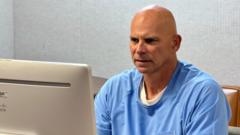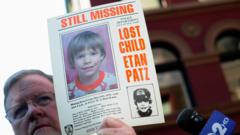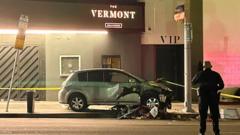The Menendez brothers have experienced a significant setback in their quest for freedom as Lyle Menendez has been denied parole, mirroring the decision made for his brother Erik just one day prior. Both brothers, who were convicted in the brutal murder of their parents in Beverly Hills more than three decades ago, underwent lengthy hearings with California's parole board, which reviewed their cases extensively.
Menendez Brothers Denied Parole: Lyle Follows Erik in Setback

Menendez Brothers Denied Parole: Lyle Follows Erik in Setback
The Menendez brothers, convicted for the notorious 1989 murder of their parents, face continued legal challenges as Lyle Menendez has been denied parole just a day after his brother Erik.
Lyle, now 57, is eligible to reapply for parole in three years, while the implications of their denials extend beyond their own fates. The hearings, which lasted over ten hours and featured virtual testimonies from both men, delved into their lives prior to the infamous murders, the impact of their upbringing, and their conduct in prison over the years.
Both brothers have argued that the murders were committed in self-defense due to years of alleged abuse inflicted by their father, yet the prosecution painted them as calculating individuals motivated by greed. The parole board ultimately ruled that Lyle posed a "moderate risk" to society, highlighting his history of rule violations in prison, particularly concerning illicit cell phone usage. During the hearing, Lyle professed remorse over his past actions, stating, "I’m profoundly sorry for who I was," although concerns were raised regarding whether he has truly taken responsibility for his conduct.
In addition to their parole paths being blocked, the Menendez brothers also face ongoing legal battles concerning a clemency request directed at California Governor Gavin Newsom and a separate push for a new trial based on newly discovered evidence of childhood abuse. This continuing saga reflects not just a significant media narrative but also the complex intersection of justice, mental health, and the profound implications of crime and punishment on individual lives. With their future now resting in the hands of state officials, the Menendez brothers' case continues to stir public interest and debate about culpability, rehabilitation, and the possibility of redemption.
Both brothers have argued that the murders were committed in self-defense due to years of alleged abuse inflicted by their father, yet the prosecution painted them as calculating individuals motivated by greed. The parole board ultimately ruled that Lyle posed a "moderate risk" to society, highlighting his history of rule violations in prison, particularly concerning illicit cell phone usage. During the hearing, Lyle professed remorse over his past actions, stating, "I’m profoundly sorry for who I was," although concerns were raised regarding whether he has truly taken responsibility for his conduct.
In addition to their parole paths being blocked, the Menendez brothers also face ongoing legal battles concerning a clemency request directed at California Governor Gavin Newsom and a separate push for a new trial based on newly discovered evidence of childhood abuse. This continuing saga reflects not just a significant media narrative but also the complex intersection of justice, mental health, and the profound implications of crime and punishment on individual lives. With their future now resting in the hands of state officials, the Menendez brothers' case continues to stir public interest and debate about culpability, rehabilitation, and the possibility of redemption.



















